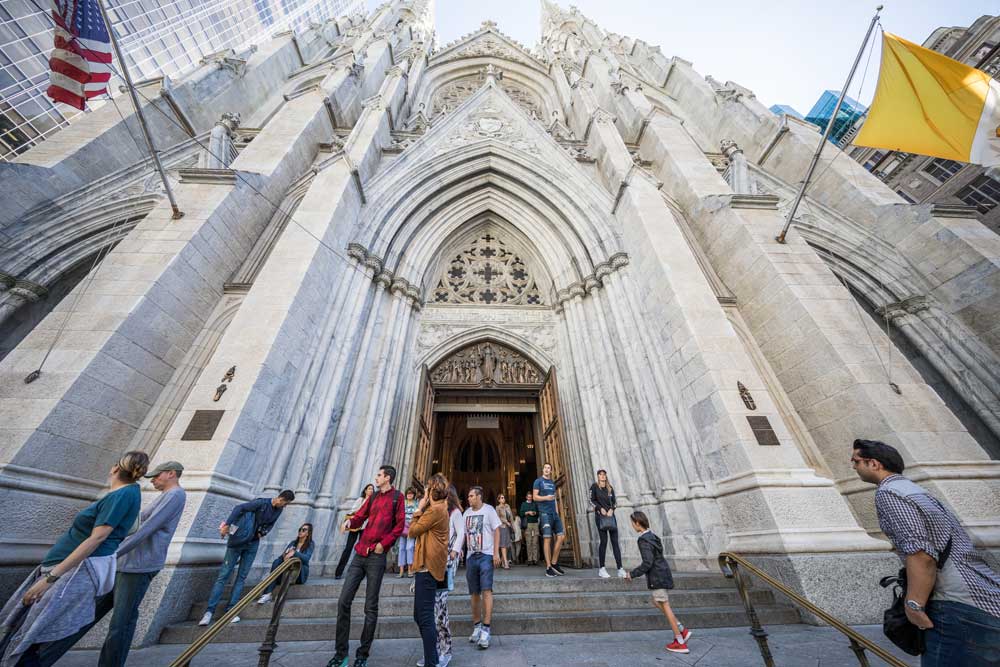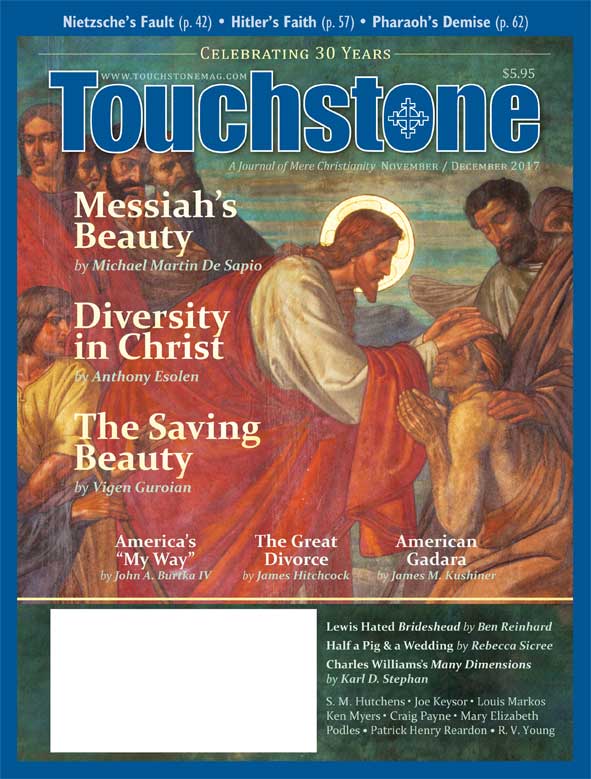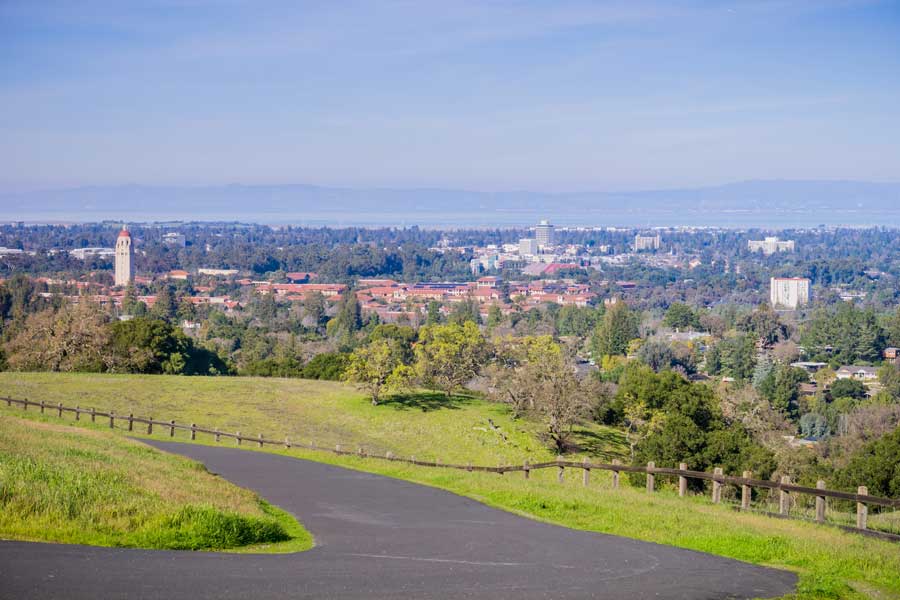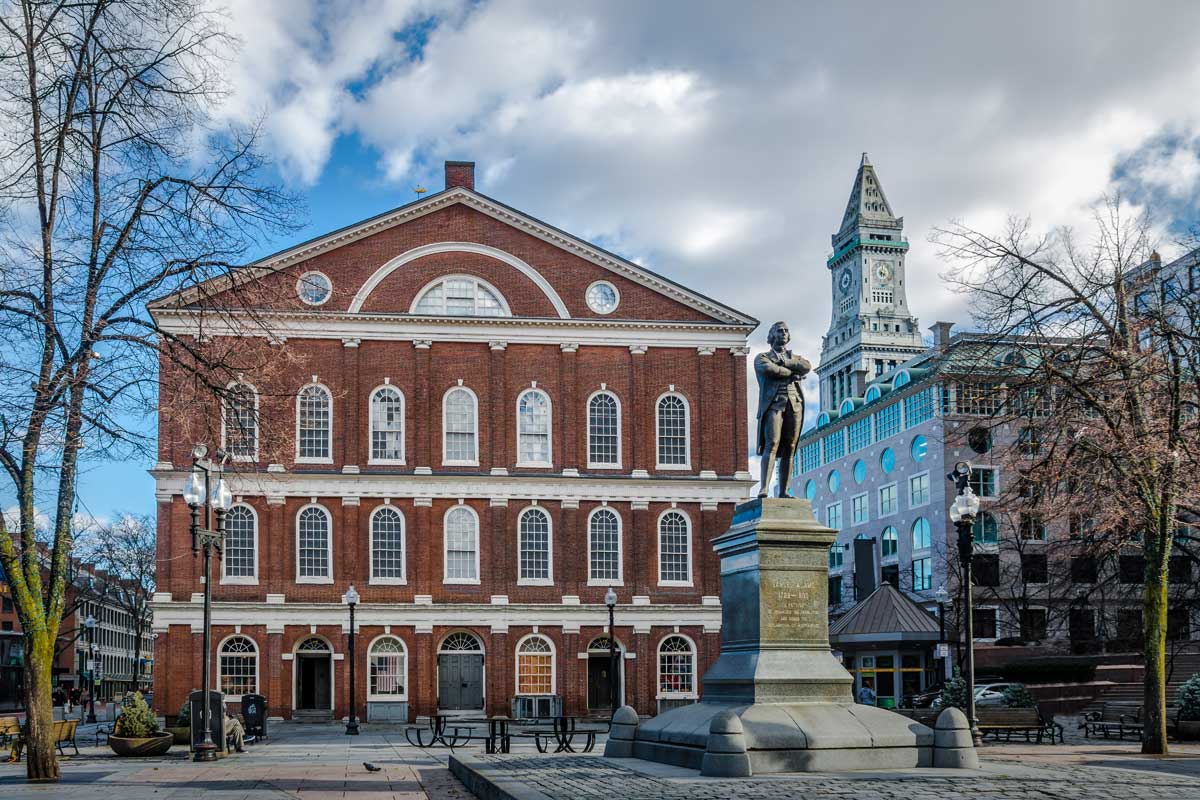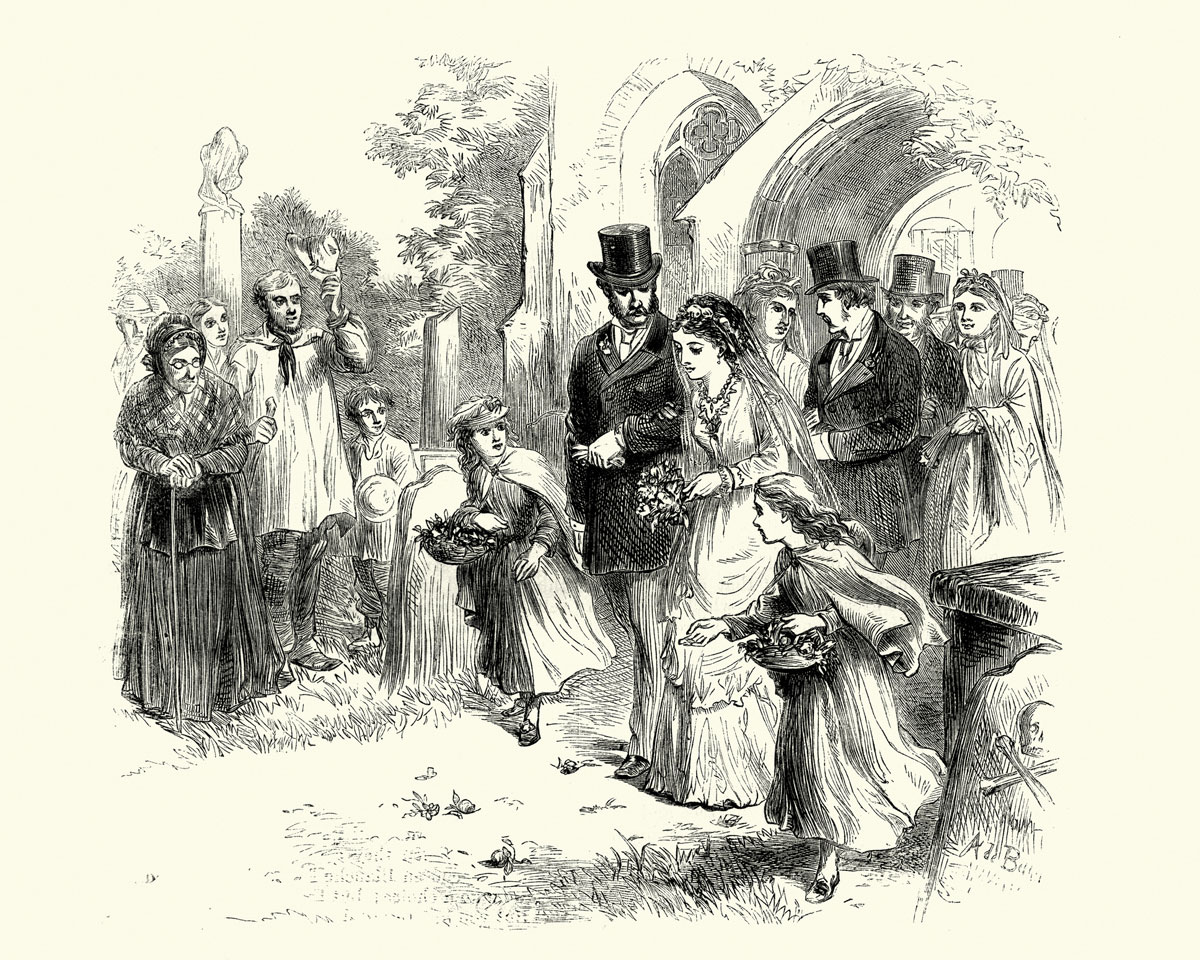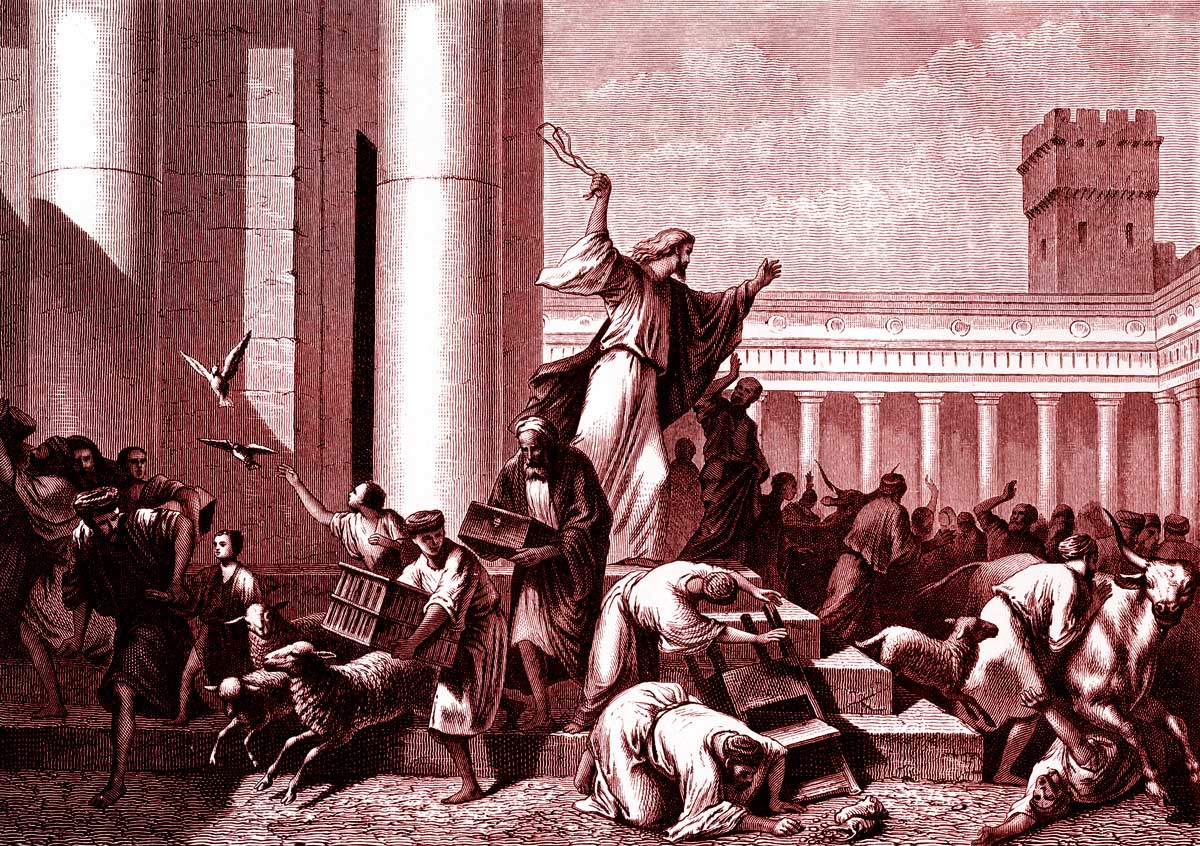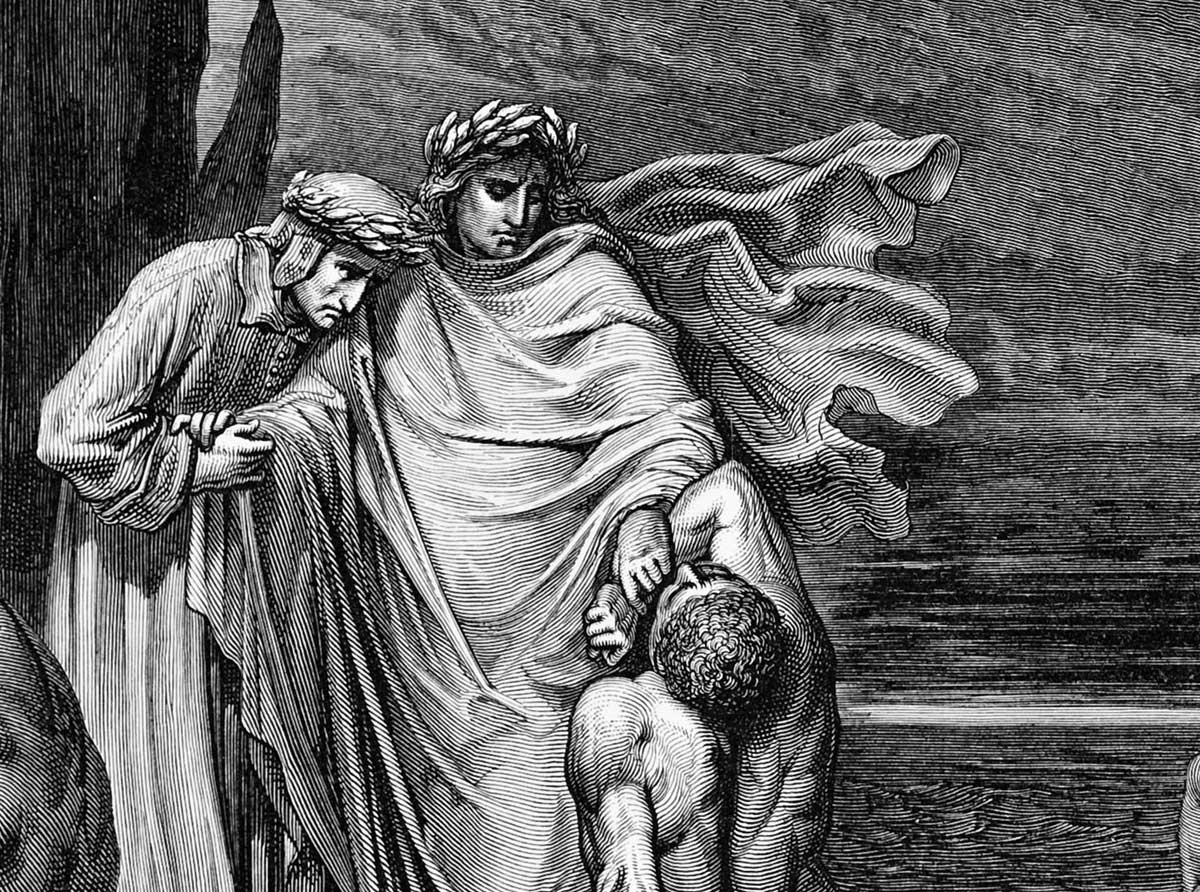Conference Talk
The Great Divorce
Christianity & the Liberal Society by James Hitchcock
For over two millennia Christianity has had an uneasy relationship with the state, something which is inherent in the very concept of the kingdom of God. Under more than two centuries of democracy, religious believers in the United States have felt relatively secure, but they now face the gravest crisis in their history.
The liberal state claims the high ground for itself, relegating the churches to a marginal role. The state proclaims that it, rather than the church, is the appropriate agency for educating the young and caring for needy souls and bodies, that it embodies the highest good of humanity. It is not coincidental that both the idea and the reality of the welfare state are farthest advanced in the most secular part of the world—northern Europe—built on the ruins of liberal Protestantism.
Liberalism Today
As the culmination of almost three centuries of Western intellectual history, liberalism espouses a philosophy in which there can be no certain conclusions and absolutists are considered dangerous and irrational. But in a seeming contradiction, as liberal philosophy undergirds politics, it has itself become a creed with infallible teachings.
This contradiction between the liberal ideal of personal freedom and the advance towards what can be called soft totalitarianism is resolved by a stunningly brazen redefinition of rights. Although the American Constitution explicitly guarantees freedom of religion, speech, and the press, and although it says nothing at all about sexual behavior, such behavior is now given priority, even to the point of denying the very rights the Constitution makes explicit.
In its present stage, liberalism requires that people not be allowed to exercise their freedom by standing in the way of progress. Abortion is a "choice," but the right to choose cannot be extended to people who reproduce "irresponsibly," and the creation of human beings through technology might produce a higher type of person. People who cling to outmoded moral beliefs cannot be allowed to indoctrinate even their own children. The deaths of the chronically ill and those deemed deficient must in some cases be facilitated by the state.
Liberalism, despite its obsessive talk about "diversity," now demands conformity of opinion on most controversial issues. In enlightened circles there is now only one legitimate position with regard to sexual behavior, the role of women, suicide, capital punishment, smoking, and numerous other things, the goal of public policy being to enforce each new consensus.
Over generations, liberal religion has been reduced to a vague kind of humanitarianism that provides no basis for resistance to the secularist agenda. So also the modern business corporation is in no way committed to traditional moral and religious values. The term "globalization" refers to the economy, but it parallels political internationalism.
For seventy years, two sides of liberalism have been in tension with one another—the classical advocacy of personal freedom versus the commitment to centralized planning as enshrined in the welfare state. The latter is now emerging triumphant, making the liberal faith anti-democratic, relying on the courts, governmental agencies, and international bodies to decree what cannot be achieved through the consent of the citizens.
The emerging liberal order is in principle totalitarian because it goes well beyond political goals and demands hegemony over ideas and beliefs as well. While liberalism for almost two centuries urged an ever-widening personal freedom, it is now virtually defined by demands for "speech codes," for punishing unfashionable opinions as "hate crimes," for using the power of government to enforce what is deemed to be responsible behavior.
The United States cannot defeat the seemingly inexorable process of internal secularization that now affects the entire Western world. But even if it could, it cannot survive the process by which international authorities increasingly have the power to regulate people's lives, as in claiming to nullify laws inhibiting abortion.
"International" organizations are in reality a form of cultural imperialism, advancing the values of the most "progressive" northern European countries. Christian influence at the United Nations is negligible; the chief obstacle to the secularist agenda there is the power of the Muslim nations.
Throughout the West, the liberal agenda is especially directed against traditional religious and moral values. It seeks to exclude religion from meaningful participation in public life and reverses long-held beliefs about such things as sexual identity and behavior. How this came about is a long and complex story.
Roots of the Idea of Religious Toleration
In a sense, the Protestant Reformers of the sixteenth century were the first liberals, in their proclamation of emancipation from Catholic authority. But the Protestant churches quickly developed their own standards of orthodoxy and their own forms of discipline, and they just as quickly came to depend on the enforcing power of the state. Only a few men on the "left wing" of the Reformation advocated religious toleration.
Church-state relations were complex, shifting, and paradoxical. Religion could serve as the moral basis either of obedience to the state or of rebellion. Religious divisions led to challenges to state authority, as by Huguenot apologists in France and by certain Jesuits, notably Robert Bellarmine.
Although religious toleration eventually came to be seen as one of the defining marks of the liberal society, it was initially achieved in most cases not by assertions of personal freedom or the inviolability of conscience but by princely grants, for pragmatic reasons.
It was in England that the complex relations between church and state had the most far-reaching consequences and where liberalism had its birth.
The Puritans came to advocate either a quasi-democratic congregational or a quasi-republican presbyterian system of church government, and eventually (and temporarily) they abolished the monarchy.
After the second overthrow of the monarchy, in 1688, John Locke—often called the founder of liberalism—proposed the seminal theory of a social contract that the people could revoke if their liberty was threatened by the state. He was also the principal theorist of toleration, urging freedom for all forms of Christianity except Catholicism, and also atheists.
From the beginning, the idea of toleration was of necessity evasive on the question of religious truth, as it was with Jean Bodin, Pierre Bayle, and John Milton. The liberal approach to religion left open a question that would keep returning—could toleration be extended even to those who were themselves deemed to be intolerant?
The commonwealth, according to Locke, existed only to help men advance their "civil interests," and neither God nor the people had given the magistrate any authority over men's souls.
But across the English Channel the spirit was quite different.
The Enlightenment & French Revolution
The Age of Reason got its name because the philosophes claimed to have emerged from the darkness and superstition that had long prevailed. The new rationalism fostered an attitude of suspicion or outright animosity toward almost all existing beliefs and institutions, each of which now had to justify itself. The dominant philosophes saw Christianity, especially Catholicism, as an evil social influence.
However, this new spirit was also claimed by the "enlightened despots," such as the Holy Roman Emperor -Joseph II (1765–1790), who interested himself in religion to the point where he even decreed the number of candles to be placed on the altar, a policy of control of the church that came to be called Josephinism. The enlightened despots thought of themselves as centralizing their realms so as to make them more ordered, a goal to which the church was at least a passive obstacle.
The Enlightenment attempted to discredit Christianity in three ways: as the incubator of hatred and violence, as based on a false understanding of its own origins, and as merely one manifestation among many of the natural human religious instinct. All three accusations are now being reprised.
Thus, ancient Gnosticism has been declared to be the most authentic form of early Christianity, of which orthodoxy is a distortion. During the Enlightenment, Christianity's critics were divided on whether to dismiss Jesus as a deluded fraud or to claim him as their own. Today the second strategy is almost universally favored, it being thought that the most lethal blow against Christianity is to capture its founder and demonstrate that for two thousand years his followers have betrayed his teachings.
The French Revolution's attempts to establish a new religion that repudiated Christianity while retaining the religious instinct has its parallel today in the various New Age movements and in the ubiquitous claims to be "spiritual but not religious."
The aim of the Enlightenment was not toleration but the replacement of one kind of orthodoxy by another, demanding liberation from political and religious authority but by no means espousing complete freedom of expression.
The Revolution was initially triggered by specific practical issues, especially the crown's chronic financial deficits and a series of bad harvests. But inevitably it had to do with the issue of religion, which was "resolved" by the seizure of the wealth of the church, after which priests were declared to be salaried employees of the government, and required to take an oath to foreswear all higher obedience.
France's revolutionary government was the first in Europe to grant general religious toleration, making non-Catholics fully equal to Catholics as citizens. But this tolerance was short-lived. Ultimately the Revolution was hostile to all religion, because religion invoked a spiritual reality higher than that of the state. The Revolution created an entirely new religion, and under the dominance of Maximilien Robespierre, all deviations from revolutionary orthodoxy became treason.
The French Enlightenment spawned an ideology that demanded liberty but ended in tyrannical terror, something that seems a contradiction only if one ignores the real meaning of the Enlightenment idea of liberty, which was primarily liberation from the authority of religion. This "liberation" had to be imposed on people if they would not choose it for themselves.
The French Revolution thus became the first experiment in totalitarianism. In its brief few years, it offered both a promise of freedom that would become the governing ideal of modern life and a preview of a future in which reason might turn irrational and freedom might lead to tyranny.
Nineteenth-Century Developments
Nineteenth-century liberalism in its most basic form simply demanded free elections, governments answerable to their citizens, and civil liberties. It relativized the authorities of church and state but did not necessarily require the end of monarchy or a state church.
Most nineteenth-century Catholic leaders were deeply suspicious of liberalism because of their belief that the social and political orders were based on divine law and could not be altered merely by human will.
The antagonism between the Catholic Church and liberalism became a vicious circle—the church condemned liberalism as a subversion of divine order, while liberals opposed the church as a remnant of the Old Regime and an enemy of progress. Catholic condemnations of liberalism partly stemmed from the fact that the movement appeared to be a sham, promising freedom while imposing restrictions on the church, and sometimes even outright persecution.
In some ways the most important part of the liberal program was universal, state-sponsored education, which to a great extent was deliberately intended to bring about the secularization of society. In France, notably, Catholic schools were periodically closed or restricted.
Pope Pius IX (1846–1878) in effect held that the Catholic religion should be "the only religion of the state" and denied that there should be freedom of worship and speech. Summing up, he famously proclaimed, "If anyone thinks that the Roman Pontiff can and should reconcile himself and come to terms with progress, with liberalism, and with modern civilization, let him be anathema."
But consonant with that, he also condemned the idea that the state was the ultimate authority in human affairs. The separation of the Catholic Church from monarchy was achieved by a reactionary pope. (Perhaps unknown to Pius, there were some working models of Catholic participation in the liberal order—England, Ireland, the United States, Belgium, and Poland.)
Pope Leo XIII (1878–1903) warned against the excesses of democracy but accepted it on a pragmatic basis. With the signing of the Lateran Treaties in 1929, Pius XI (1922–1939) in effect settled the fifteen-hundred-year-old question of the temporal power of the papacy, which the popes now implicitly recognized as neither necessary nor appropriate to their office.
The Second Vatican Council (1962–1965) affirmed a kind of liberalism with regard to religious freedom. Traditional Catholic doctrine held that religious liberty could only be justified for pragmatic reasons. But while reaffirming that "error has no rights," the council stated that the basis of toleration is not indifference to truth but respect even for those who might be in error.
Britain & America
The British Enlightenment differed from that of Continental Europe especially in coexisting with organized religion, and it was in England that liberalism came closest to living up to its professed principles.
Religious skeptics were kept on the defensive towards Christianity, which was simply taken for granted as the moral foundation of society. The governments of the British Empire never required civil marriages, and religious education flourished at all levels, often encouraged by the state.
North America was unique in the seventeenth century in harboring the only society in the world—New England—that had been founded for explicitly religious reasons and that defined itself primarily in religious terms. Nowhere else did the civil law attempt to enact the biblical law more completely.
The Puritans practiced persecution in good conscience, in accord with prevailing opinion at the time. Roger Williams, whom they banished from Salem, articulated theories of religious freedom and of church-state separation that were radical for their time and that became permanent elements of the Baptist heritage, a "liberal" position that owed almost nothing to secular liberal ideas.
The American Revolution was unique among revolutions in that, while it eventually led to the disestablishment of official churches, it was not anti-religious and even claimed religious justification for itself.
In proclaiming "self-evident" truths, the Americans made a claim that logically (although not at first acknowledged) extended to the whole human race, making the United States the first truly liberal polity.
The Bill of Rights was taken seriously, and nowhere more than with regard to freedom of religion. Despite the prejudices spawned by both Protestantism and the Enlightenment, the Founding Fathers were clear that Catholics (and Jews) enjoyed full religious freedom.
The Founders also negotiated a settlement between the skepticism of the Enlightenment and a vigorous popular religiosity, a compromise in which the religious element was the more important of the two, since it affected by far the greater number of people. The resurgence of Evangelical faith called the Second Great Awakening stamped on the country a deeply Christian character that survives into the twenty-first century.
From the beginning there was a kind of de facto establishment of a generalized kind of Protestantism, as manifested by official chaplaincies in the legislatures and the armed forces, religious symbols in public places, public business sealed by religious oaths, religious references endemic to political discourse, fervent reiteration of the conviction that God ruled over the nation, insistence that good citizenship rested on a religiously inspired moral foundation, religious practices and instruction in public schools.
For a long time after 1789, the United States was the only country in the world where the churches enjoyed unrestricted rights of self-government, since religious liberty was not conferred by the state but was a natural right. Belatedly, in 1925, the Supreme Court ruled definitively that "the child is not the mere creature of the state," a declaration that now stands as a formidable barrier to the encroachments of the liberal state.
However, the "common [public] school" movement had an explicitly ideological agenda—that of strengthening liberal Protestantism against residual New England Puritanism. The educational pioneer Horace Mann thought conservative religion was both intellectually untenable and socially undesirable and that a liberal form of Christianity ought to be acceptable to everyone.
In effect, modern American secularists fault the American Founding Fathers for having failed to realize the full Enlightenment agenda. Without explicitly saying so, American secular liberals appeal to the French, not the American, Revolution, so that, to a degree unprecedented in American history, there now exists a fierce anti-religious animosity.
Free Markets, Freedom & Restraint
The idea of the "free market" was inherent in liberalism from the beginning, since liberty of religion, speech, and the press logically also included the freedom to buy and sell, unhindered by outmoded and oppressive laws.
The first movement towards the modern "welfare state" occurred in Germany under the conservative Otto von Bismarck (1815–1898). In England, the conservative Prime Minister Benjamin Disraeli (1804–1881) also seized the initiative for social reform.
Catholic social thought, as synthesized by Pope Leo XIII, condemned the heartlessness of the unrestrained free market and affirmed the laborer's right to a just wage. In the United States, Catholic social thought came primarily to mean support of labor unions and the welfare state. By the end of the nineteenth century, an identifiable Protestant "social gospel" had also been forged.
As unrestrained capitalism came to be seen as itself a barrier to human freedom, liberalism—paradoxically—came to stand for increased governmental authority, as in the Progressivist movement of the early twentieth century. It was a movement especially of intellectuals, who thought that necessary changes could be implemented by a benign government for the benefit of the people—but not necessarily with their full approval.
Some Christians saw classical liberalism as giving free rein to acquisitiveness—yet another liberal abuse of freedom. But others held that wealth was given by God to certain individuals in stewardship.
Humanitarianism & Social Action
It was scarcely coincidental that liberal humanitarianism arose in a culture dominated by Christianity. In the mid-nineteenth century this newly self-conscious movement organized efforts not only to alleviate the sufferings of the needy but also to root out the causes of their suffering. It sprang mostly from Christian roots—William Wilberforce, Elizabeth Fry, Frederic Ozanam, William Booth, the Earl of Shaftesbury.
Those tempted to dismiss the liberal project as corrupt from the beginning must reflect on the anomalous fact that the true evil of abortion and infanticide, for example, only became fully obvious as part of the general humanitarian awakening of the nineteenth century. The idea of "family values"—the family circle as the center of existence—has flourished above all in modern bourgeois societies.
Conservatives cannot deny the reality of progress, which is not solely material in nature. There has been moral progress as well, in all those things achieved under the name of "humanitarianism"—the abolition of slavery, improvements in the conditions of labor, the mitigation of the sufferings of the poor, more humane treatment of criminals and the insane, a compassionate attitude toward animals, and many other things. In some respects, modern man is more morally aware than his ancestors were, even as in other respects he is less so.
When liberal theology rendered the meaning of the faith uncertain, humanitarianism was often the one Christian teaching to which even skeptics could subscribe, so that in time liberal religion no longer claimed for itself a higher wisdom but merely its participation in humanitarian efforts.
In 1919 the American Catholic bishops proposed the "restoration" of society in terms that were, in a way, an extension of progressivism—public works projects to stimulate employment, labor unions, minimum-wage laws, compensation for the unemployed and the disabled, heavy taxes on great wealth. The New Deal seemed to many Catholics to be the closest that America was likely to come to fulfilling Catholic social teaching, and most liberal Protestants supported the New Deal as well.
Along with Abolitionism and Prohibition, the Civil Rights movement was the most effective exercise of religious social action in American history. It achieved results no secular movement could have achieved, elevating its cause far above politics and making it a moral crusade.
But secular liberals who admired Martin Luther King had always been uneasy with his piety, and his assassination relieved them of having to empathize with it. Many politically active Christians also discovered that the social struggle alone now mattered, whatever religious foundation it might or might not have. Politics had itself been sacralized by what can be called modernist liberalism.
Modernism is an ideology that embraces change as an imperative and regards the past solely as a burden. It is an almost religious commitment to change, an ingrained need to destroy obstructive traditions.
Although the term "modernism" was not used, in the French Revolution this spirit erupted with a ferocious energy that would carry over into numerous areas of life, so that the task of destroying the old in the name of the new would henceforth be close to the center of the cultural life of the West. The term ensconced itself especially in art. (The official Revolutionary calendar began with the year One, thereby abolishing seventeen centuries of history).
The Converging Paths of Liberalism & Modernism
The word "nihilism" has various meanings, the most important of which is a voluntarist will to annihilate. It originates from deep and sinister springs in the human psyche—the love of negation and annihilation for their own sakes, which might be identified as Original Sin. It is inherent in true modernism.
The ingrained sense that all authority is the enemy of freedom made anarchical terrorism modernism's ultimate expression. True terrorism is gratuitous, with each apparent victory necessarily followed by the identification of yet another imposition on the self.
Liberalism developed almost simultaneously with modernism, though for a long time liberalism balanced openness to change with respect for tradition—envisioning a society of ordered liberty in which constraints on individuals were required precisely in order to allow liberty to flourish. But liberalism itself had no inherent basis for legitimizing such constraints, except the vague exhortation not to harm others.
Thus, although liberals of even sixty years ago would never have recognized it, the compulsive rejection of all "impositions" on the self, a reflexive hostility to every kind of "taboo," is in fact the inevitable end of liberalism's own historical path. Liberalism is less and less able to affirm that traditional moral principles are anything more than unexamined customs or group interests.
From the beginning, modernism had as much to do with sexuality as with art or politics. There was a kind of sexual revolution during the Enlightenment (for the first time pornography became a thriving industry), and the full implications of the Enlightenment's "natural man" were reached by the infamous Marquis de Sade.
The modernist contempt for marriage would require a century and a half to work its way fully into the bloodstream of society, but at every stage it was a declaration of independence more significant than any political revolt.
For most of two centuries modernism was in some ways even hostile to liberalism, insofar as the latter could be dismissed as merely the rationalization of bourgeois privilege. Modernists claimed liberal freedoms for themselves even as they rejected the underlying principles behind those freedoms. (What is happening on American campuses today is directly traceable to the ideas of the German philosopher Herbert Marcuse.)
But since it is a fundamental imperative of liberalism to be "open to new ideas," it has also harbored the potential for nihilism from the beginning, an ingrained habit of reflexive negativity.
Liberalism ultimately converged with nihilism because it affirmed the value of "freedom" without being able to say how freedom transcended mere self-will, because any such specification would be precisely an infringement of freedom. Liberals who might be uncomfortable with this had no firm basis for rejecting it.
Thus, liberalism increasingly defined its task as simply that of expanding the scope of freedom, and it found it intellectually and emotionally difficult to oppose anything that presented itself as an exercise of freedom. Liberals continued to insist that freedom must be used responsibly, but their sense of what was responsible had to be imported from outside liberalism itself, an inheritance from the past against which modernism rebelled and about which liberals felt deep ambivalence.
Thus, the liberal idea of freedom eventually merged, almost seamlessly, with the modernist claim that every assertion of personal autonomy, every assault on established values, is liberating. Modernism's demand, which liberals were increasingly willing to meet, was, at a minimum, to "understand" behavior that was plainly evil, and then to lay responsibility for it at the door of "society."
The Nihilism of Fascism & Communism
Modernism also spawned a certain sympathy for extreme politics, by undermining traditional beliefs and leaving society with few defenses against totalitarianism. (Weimar Germany between the World Wars was in some ways the textbook embodiment of the spirit of modernism.) Some liberals harbor a sneaking admiration for those they perceive as daring enough to employ drastic methods on behalf of good causes.
Both communism and fascism were nihilistic in proclaiming that civilization was finally nothing more than the imposition of power. Like the French Revolution, both set out to obliterate all signs of a reality higher than the state, and both won modernist admiration through bold, transgressive actions and hatred of "bourgeois values."
The horrors of both fascism and communism could not be dismissed as mere atavisms. Both movements were in part the offspring of modernism, in that they were committed to unimpeded technological development, new forms of social and political organization, centralized state planning, and liberation from the dead hand of the past. Fascism celebrated the raw reality of power and war as the highest and ultimate human action. Both fascism and communism wiped the slate clean and, by prodigious acts of the will, sought to create something entirely new.
Fascist and communist governments were modernist in that they deliberately set out to obliterate any moral sense independent of the state. The appeal of totalitarianism, in modernist terms, was the inexorable march into the future.
A Weak Antidote
Liberalism and modernism, having moved on parallel tracks for a century and a half, finally converged in the mythic "Sixties," or more precisely, in the year 1968. Since then, all of Western society has been in crisis, experiencing nothing less than a transvaluation of values, with most of the institutions that supposedly embody normative beliefs now vulnerable to the very spiritual illnesses they are supposed to heal.
Modernists habitually skate close to the ultimate negation, then slide away. Material prosperity now serves as a kind of anesthetic against the nihilism now spreading through bourgeois culture. But the culture of poverty at its most extreme displays even more appalling results of modernist negation—naked lust, greed, hatred, and violence, a war of all against all, a situation in which poor people trying to live ordered lives are the principal victims.
To all of this, liberal Christianity has been at best a very weak antidote, placing the churches in a habitually defensive posture towards Christianity's "cultured despisers." Its fallacy stemmed from the fact that, while it was tireless in its efforts to come to terms with those despisers, over time that very effort undermined the credibility of the faith. People seek in religion authoritative guidance as to the meaning of life, and a church that possesses no unique wisdom eventually loses even many of the people who share that uncertainty.
The sleeping giant of Fundamentalism, partly awakened by the cultural revolution of the Sixties, is now condemned as a cause of division and strife, partly because it disturbs secularists' comfortable assumption that religion is a dying phenomenon.
While religious wars have long since ceased in the West, and while modern history has repeatedly demonstrated that secular creeds like nationalism, fascism, and communism are far more deadly than religion, it is religion that continues to raise alarms. Christianity is feared not for what it does but merely for the fact that it exists.
It is aggressive skeptics, not theologians, who now wield the power of censorship, somehow finding freedom of thought to require the suppression of ideas.
Liberalism's Moral Collapse
Liberalism has now quite obviously run its course, to the point where its very concept of liberty is now bankrupt. The classical warning not to confuse liberty with license is ridiculed, and liberalism as a working ideology finds few forms of self-expression that it is unwilling to enhance.
There is no stronger example of the moral collapse of liberalism than the way in which it has now turned its back on the weakest and most vulnerable members of society—the unborn, infants, the sick, the elderly—precisely the kinds of people liberalism at its best was supposed to defend and protect.
A basic conservative principle ought to be, "Every good thing eventually goes bad." Caution is a basic conservative instinct, and the two-hundred-year course of genuine liberalism from flowering to disintegration was foreordained precisely by its Promethean pride.
James Hitchcock is Professor emeritus of History at St. Louis University in St. Louis. He and his late wife Helen have four daughters. His most recent book is the two-volume work, The Supreme Court and Religion in American Life (Princeton University Press, 2004). He is a senior editor of Touchstone.
subscription options
Order
Print/Online Subscription

Get six issues (one year) of Touchstone PLUS full online access including pdf downloads for only $39.95. That's only $3.34 per month!
Order
Online Only
Subscription

Get a one-year full-access subscription to the Touchstone online archives for only $19.95. That's only $1.66 per month!
bulk subscriptions
Order Touchstone subscriptions in bulk and save $10 per sub! Each subscription includes 6 issues of Touchstone plus full online access to touchstonemag.com—including archives, videos, and pdf downloads of recent issues for only $29.95 each! Great for churches or study groups.
Transactions will be processed on a secure server.
more on liberalism from the online archives
more from the online archives
calling all readers
Please Donate
"There are magazines worth reading but few worth saving . . . Touchstone is just such a magazine."
—Alice von Hildebrand
"Here we do not concede one square millimeter of territory to falsehood, folly, contemporary sentimentality, or fashion. We speak the truth, and let God be our judge. . . . Touchstone is the one committedly Christian conservative journal."
—Anthony Esolen, Touchstone senior editor





